BTEC FPT International Economy: COVID-19 Mental Health Impact
VerifiedAdded on 2022/03/08
|9
|2815
|54
Report
AI Summary
This report analyzes the significant impact of the COVID-19 pandemic on mental health in Vietnam. It begins with an introduction outlining the reasons for choosing the topic and research objectives, emphasizing the pandemic's disruption to daily life and its effects on mental well-being. The report defines mental health, explores the causes of mental health issues during the pandemic, and details the various impacts, including increased stress, anxiety, and depression, as well as the effects on students and healthcare workers. It presents research findings, including studies conducted in Vietnam, highlighting the psychological pressures experienced by the population. The report then proposes several solutions, such as maintaining a healthy lifestyle, limiting exposure to excessive COVID-19 news, and expanding social circles, to mitigate the pandemic's negative effects. The conclusion reinforces the importance of prioritizing mental health and well-being, along with a list of references.
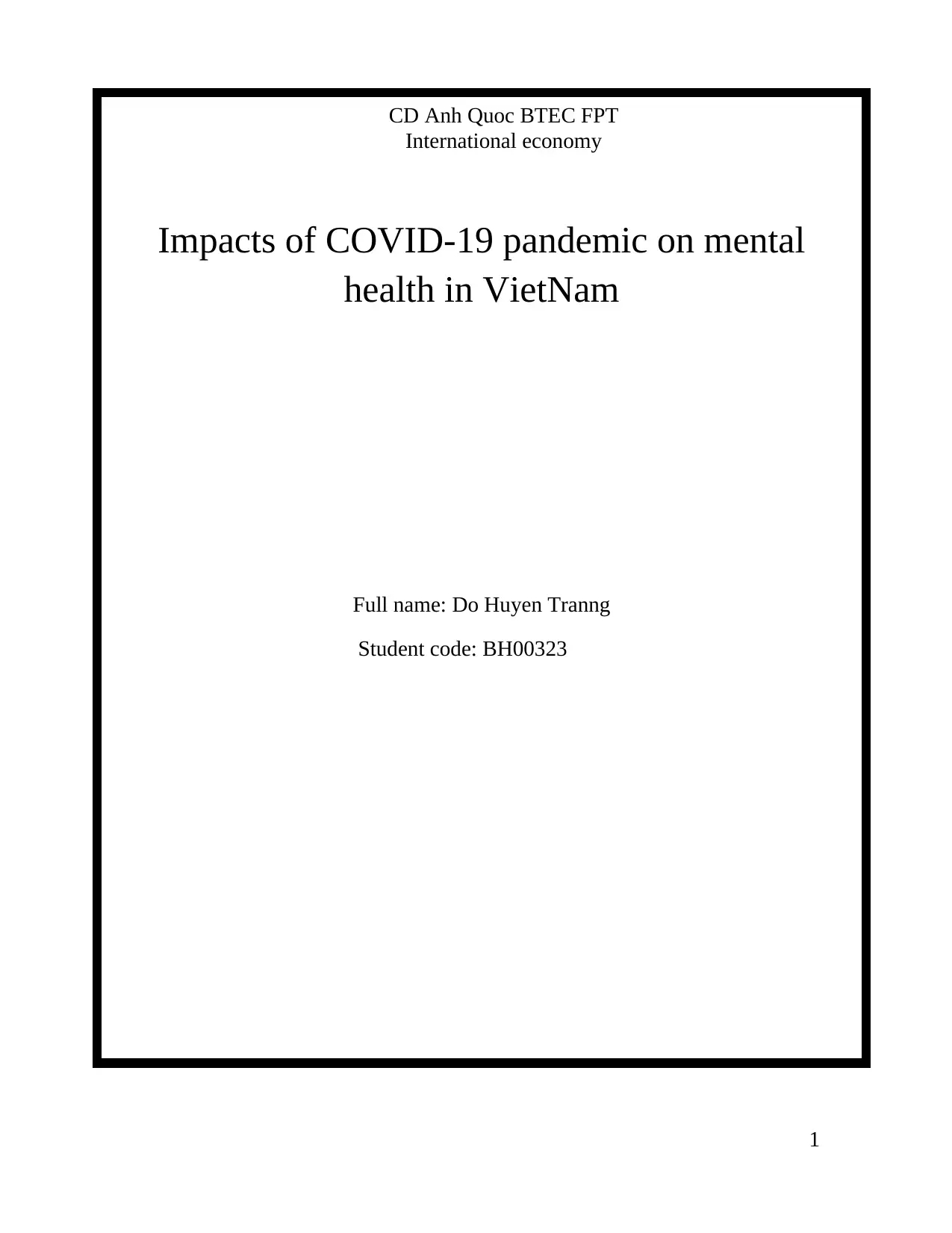
1
CD Anh Quoc BTEC FPT
International economy
Impacts of COVID-19 pandemic on mental
health in VietNam
Full name: Do Huyen Tranng
Student code: BH00323
CD Anh Quoc BTEC FPT
International economy
Impacts of COVID-19 pandemic on mental
health in VietNam
Full name: Do Huyen Tranng
Student code: BH00323
Paraphrase This Document
Need a fresh take? Get an instant paraphrase of this document with our AI Paraphraser
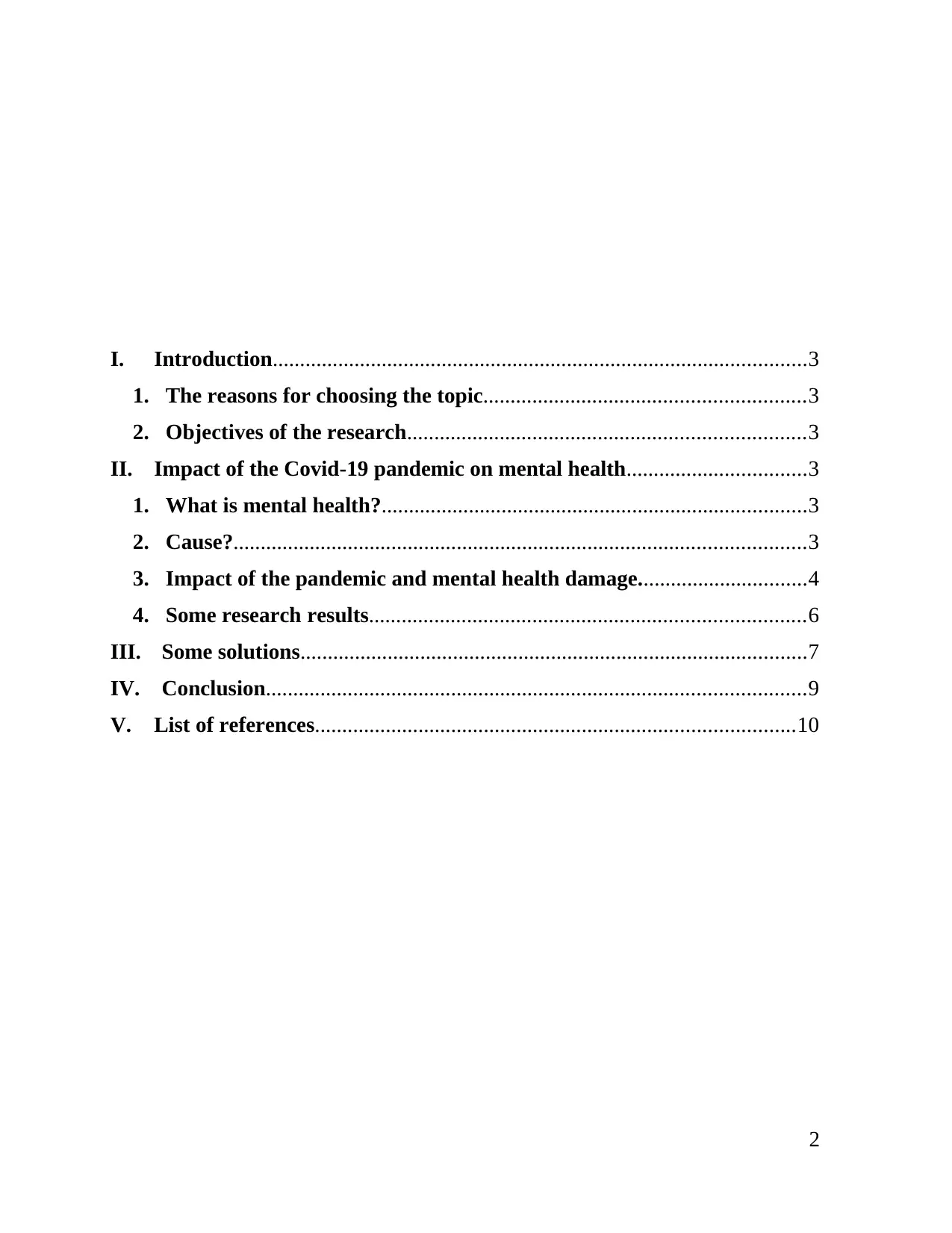
I. Introduction..................................................................................................3
1. The reasons for choosing the topic...........................................................3
2. Objectives of the research.........................................................................3
II. Impact of the Covid-19 pandemic on mental health.................................3
1. What is mental health?..............................................................................3
2. Cause?.........................................................................................................3
3. Impact of the pandemic and mental health damage...............................4
4. Some research results................................................................................6
III. Some solutions.............................................................................................7
IV. Conclusion...................................................................................................9
V. List of references........................................................................................10
2
1. The reasons for choosing the topic...........................................................3
2. Objectives of the research.........................................................................3
II. Impact of the Covid-19 pandemic on mental health.................................3
1. What is mental health?..............................................................................3
2. Cause?.........................................................................................................3
3. Impact of the pandemic and mental health damage...............................4
4. Some research results................................................................................6
III. Some solutions.............................................................................................7
IV. Conclusion...................................................................................................9
V. List of references........................................................................................10
2
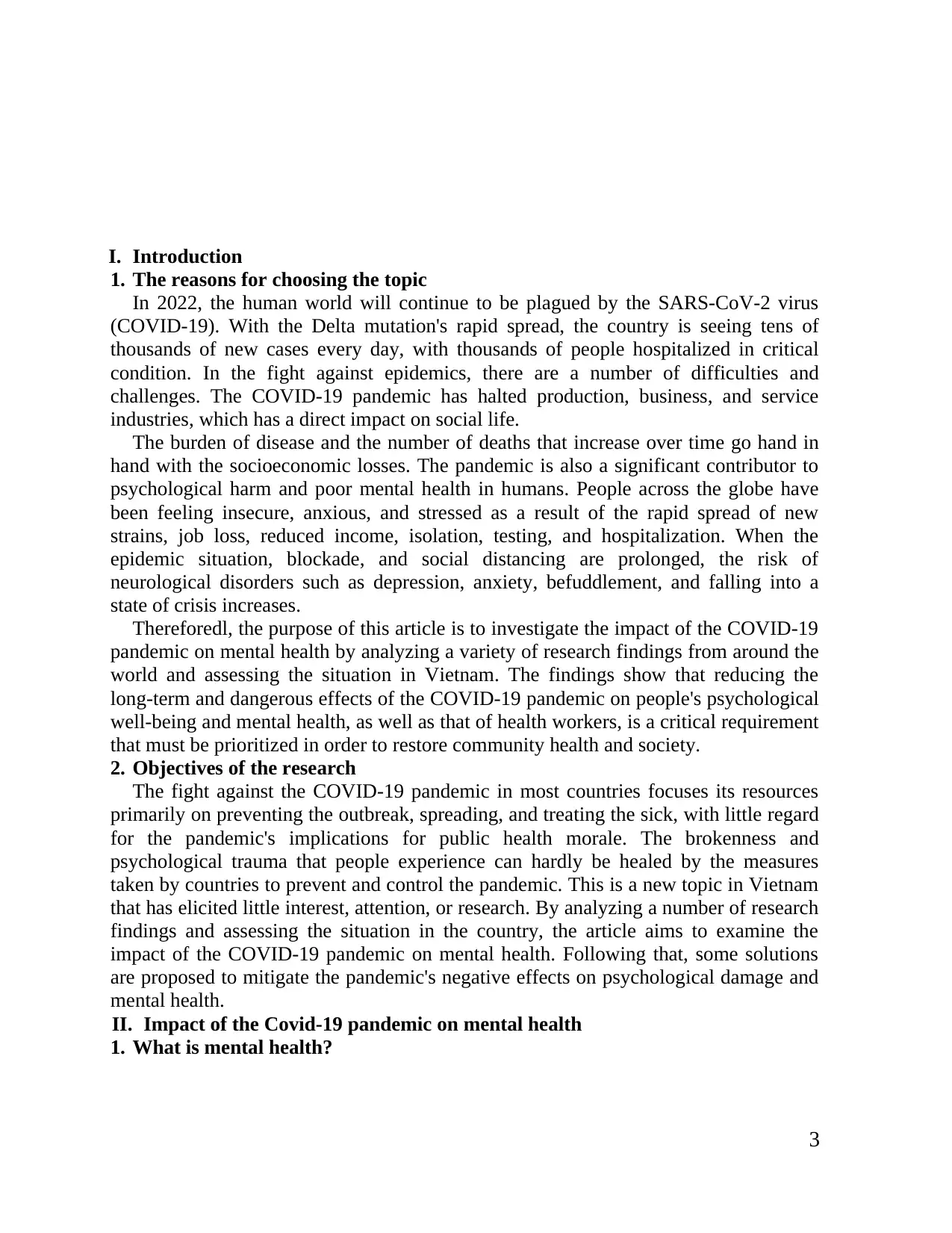
I. Introduction
1. The reasons for choosing the topic
In 2022, the human world will continue to be plagued by the SARS-CoV-2 virus
(COVID-19). With the Delta mutation's rapid spread, the country is seeing tens of
thousands of new cases every day, with thousands of people hospitalized in critical
condition. In the fight against epidemics, there are a number of difficulties and
challenges. The COVID-19 pandemic has halted production, business, and service
industries, which has a direct impact on social life.
The burden of disease and the number of deaths that increase over time go hand in
hand with the socioeconomic losses. The pandemic is also a significant contributor to
psychological harm and poor mental health in humans. People across the globe have
been feeling insecure, anxious, and stressed as a result of the rapid spread of new
strains, job loss, reduced income, isolation, testing, and hospitalization. When the
epidemic situation, blockade, and social distancing are prolonged, the risk of
neurological disorders such as depression, anxiety, befuddlement, and falling into a
state of crisis increases.
Thereforedl, the purpose of this article is to investigate the impact of the COVID-19
pandemic on mental health by analyzing a variety of research findings from around the
world and assessing the situation in Vietnam. The findings show that reducing the
long-term and dangerous effects of the COVID-19 pandemic on people's psychological
well-being and mental health, as well as that of health workers, is a critical requirement
that must be prioritized in order to restore community health and society.
2. Objectives of the research
The fight against the COVID-19 pandemic in most countries focuses its resources
primarily on preventing the outbreak, spreading, and treating the sick, with little regard
for the pandemic's implications for public health morale. The brokenness and
psychological trauma that people experience can hardly be healed by the measures
taken by countries to prevent and control the pandemic. This is a new topic in Vietnam
that has elicited little interest, attention, or research. By analyzing a number of research
findings and assessing the situation in the country, the article aims to examine the
impact of the COVID-19 pandemic on mental health. Following that, some solutions
are proposed to mitigate the pandemic's negative effects on psychological damage and
mental health.
II. Impact of the Covid-19 pandemic on mental health
1. What is mental health?
3
1. The reasons for choosing the topic
In 2022, the human world will continue to be plagued by the SARS-CoV-2 virus
(COVID-19). With the Delta mutation's rapid spread, the country is seeing tens of
thousands of new cases every day, with thousands of people hospitalized in critical
condition. In the fight against epidemics, there are a number of difficulties and
challenges. The COVID-19 pandemic has halted production, business, and service
industries, which has a direct impact on social life.
The burden of disease and the number of deaths that increase over time go hand in
hand with the socioeconomic losses. The pandemic is also a significant contributor to
psychological harm and poor mental health in humans. People across the globe have
been feeling insecure, anxious, and stressed as a result of the rapid spread of new
strains, job loss, reduced income, isolation, testing, and hospitalization. When the
epidemic situation, blockade, and social distancing are prolonged, the risk of
neurological disorders such as depression, anxiety, befuddlement, and falling into a
state of crisis increases.
Thereforedl, the purpose of this article is to investigate the impact of the COVID-19
pandemic on mental health by analyzing a variety of research findings from around the
world and assessing the situation in Vietnam. The findings show that reducing the
long-term and dangerous effects of the COVID-19 pandemic on people's psychological
well-being and mental health, as well as that of health workers, is a critical requirement
that must be prioritized in order to restore community health and society.
2. Objectives of the research
The fight against the COVID-19 pandemic in most countries focuses its resources
primarily on preventing the outbreak, spreading, and treating the sick, with little regard
for the pandemic's implications for public health morale. The brokenness and
psychological trauma that people experience can hardly be healed by the measures
taken by countries to prevent and control the pandemic. This is a new topic in Vietnam
that has elicited little interest, attention, or research. By analyzing a number of research
findings and assessing the situation in the country, the article aims to examine the
impact of the COVID-19 pandemic on mental health. Following that, some solutions
are proposed to mitigate the pandemic's negative effects on psychological damage and
mental health.
II. Impact of the Covid-19 pandemic on mental health
1. What is mental health?
3
⊘ This is a preview!⊘
Do you want full access?
Subscribe today to unlock all pages.

Trusted by 1+ million students worldwide
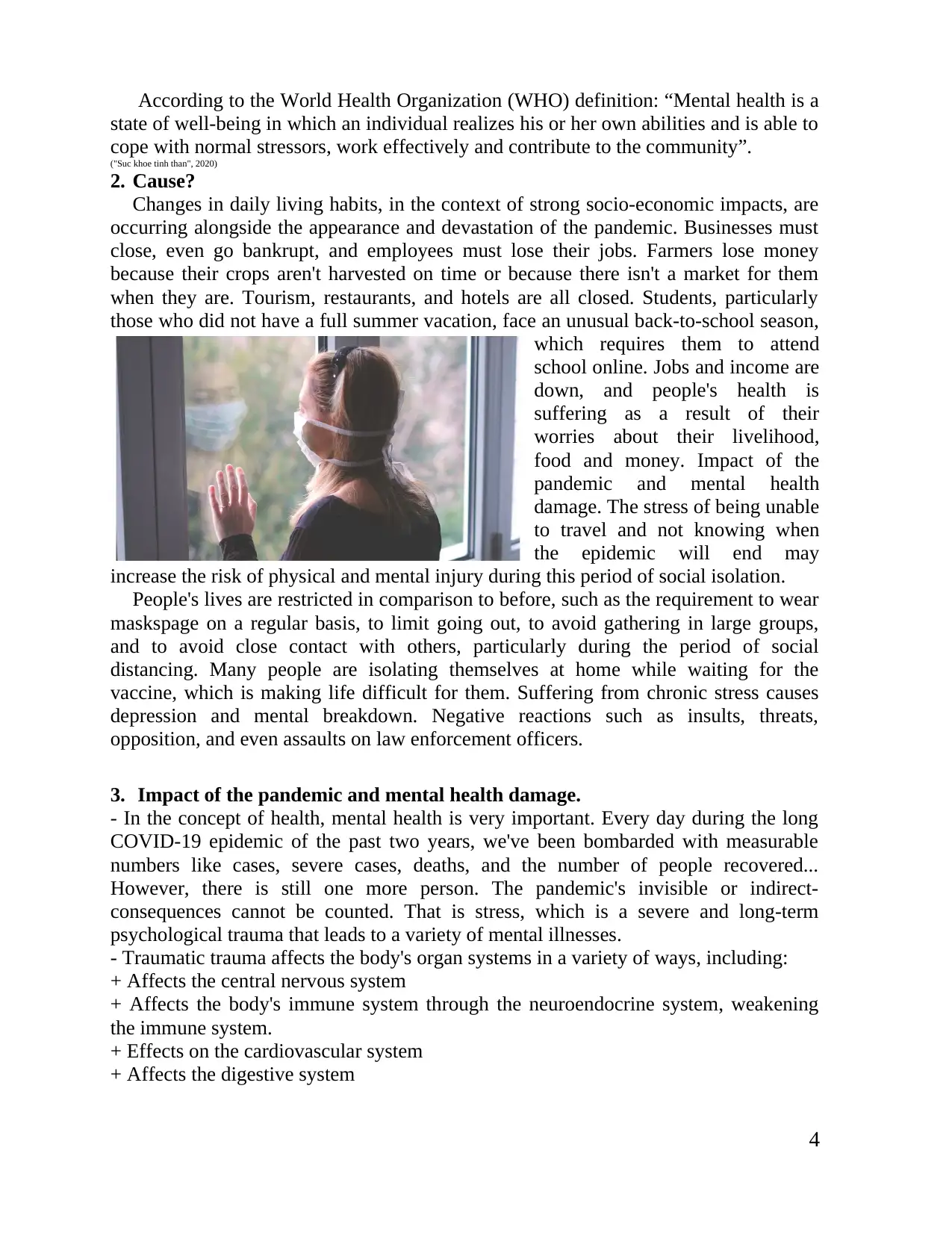
According to the World Health Organization (WHO) definition: “Mental health is a
state of well-being in which an individual realizes his or her own abilities and is able to
cope with normal stressors, work effectively and contribute to the community”.
("Suc khoe tinh than", 2020)
2. Cause?
Changes in daily living habits, in the context of strong socio-economic impacts, are
occurring alongside the appearance and devastation of the pandemic. Businesses must
close, even go bankrupt, and employees must lose their jobs. Farmers lose money
because their crops aren't harvested on time or because there isn't a market for them
when they are. Tourism, restaurants, and hotels are all closed. Students, particularly
those who did not have a full summer vacation, face an unusual back-to-school season,
which requires them to attend
school online. Jobs and income are
down, and people's health is
suffering as a result of their
worries about their livelihood,
food and money. Impact of the
pandemic and mental health
damage. The stress of being unable
to travel and not knowing when
the epidemic will end may
increase the risk of physical and mental injury during this period of social isolation.
People's lives are restricted in comparison to before, such as the requirement to wear
maskspage on a regular basis, to limit going out, to avoid gathering in large groups,
and to avoid close contact with others, particularly during the period of social
distancing. Many people are isolating themselves at home while waiting for the
vaccine, which is making life difficult for them. Suffering from chronic stress causes
depression and mental breakdown. Negative reactions such as insults, threats,
opposition, and even assaults on law enforcement officers.
3. Impact of the pandemic and mental health damage.
- In the concept of health, mental health is very important. Every day during the long
COVID-19 epidemic of the past two years, we've been bombarded with measurable
numbers like cases, severe cases, deaths, and the number of people recovered...
However, there is still one more person. The pandemic's invisible or indirect-
consequences cannot be counted. That is stress, which is a severe and long-term
psychological trauma that leads to a variety of mental illnesses.
- Traumatic trauma affects the body's organ systems in a variety of ways, including:
+ Affects the central nervous system
+ Affects the body's immune system through the neuroendocrine system, weakening
the immune system.
+ Effects on the cardiovascular system
+ Affects the digestive system
4
state of well-being in which an individual realizes his or her own abilities and is able to
cope with normal stressors, work effectively and contribute to the community”.
("Suc khoe tinh than", 2020)
2. Cause?
Changes in daily living habits, in the context of strong socio-economic impacts, are
occurring alongside the appearance and devastation of the pandemic. Businesses must
close, even go bankrupt, and employees must lose their jobs. Farmers lose money
because their crops aren't harvested on time or because there isn't a market for them
when they are. Tourism, restaurants, and hotels are all closed. Students, particularly
those who did not have a full summer vacation, face an unusual back-to-school season,
which requires them to attend
school online. Jobs and income are
down, and people's health is
suffering as a result of their
worries about their livelihood,
food and money. Impact of the
pandemic and mental health
damage. The stress of being unable
to travel and not knowing when
the epidemic will end may
increase the risk of physical and mental injury during this period of social isolation.
People's lives are restricted in comparison to before, such as the requirement to wear
maskspage on a regular basis, to limit going out, to avoid gathering in large groups,
and to avoid close contact with others, particularly during the period of social
distancing. Many people are isolating themselves at home while waiting for the
vaccine, which is making life difficult for them. Suffering from chronic stress causes
depression and mental breakdown. Negative reactions such as insults, threats,
opposition, and even assaults on law enforcement officers.
3. Impact of the pandemic and mental health damage.
- In the concept of health, mental health is very important. Every day during the long
COVID-19 epidemic of the past two years, we've been bombarded with measurable
numbers like cases, severe cases, deaths, and the number of people recovered...
However, there is still one more person. The pandemic's invisible or indirect-
consequences cannot be counted. That is stress, which is a severe and long-term
psychological trauma that leads to a variety of mental illnesses.
- Traumatic trauma affects the body's organ systems in a variety of ways, including:
+ Affects the central nervous system
+ Affects the body's immune system through the neuroendocrine system, weakening
the immune system.
+ Effects on the cardiovascular system
+ Affects the digestive system
4
Paraphrase This Document
Need a fresh take? Get an instant paraphrase of this document with our AI Paraphraser
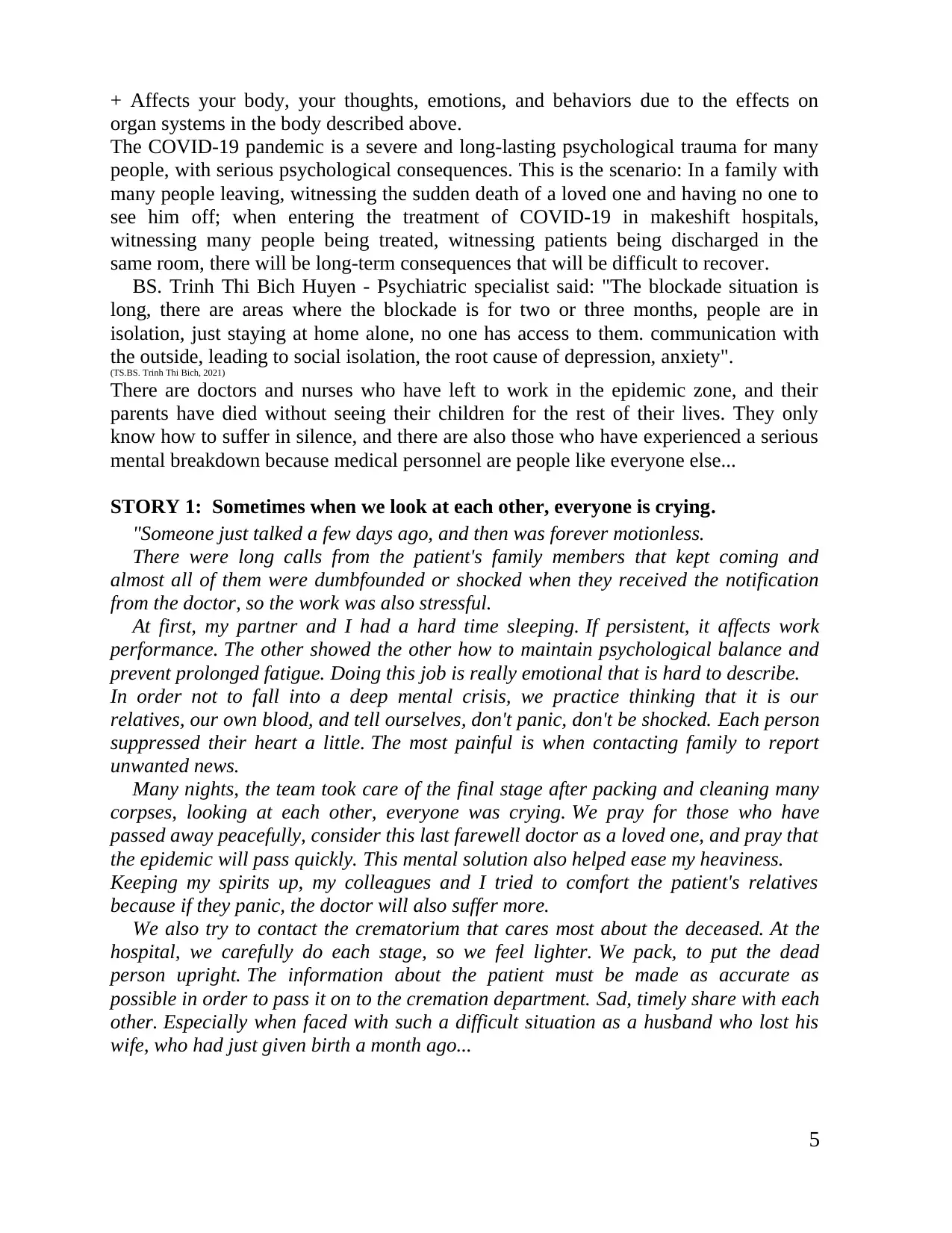
+ Affects your body, your thoughts, emotions, and behaviors due to the effects on
organ systems in the body described above.
The COVID-19 pandemic is a severe and long-lasting psychological trauma for many
people, with serious psychological consequences. This is the scenario: In a family with
many people leaving, witnessing the sudden death of a loved one and having no one to
see him off; when entering the treatment of COVID-19 in makeshift hospitals,
witnessing many people being treated, witnessing patients being discharged in the
same room, there will be long-term consequences that will be difficult to recover.
BS. Trinh Thi Bich Huyen - Psychiatric specialist said: "The blockade situation is
long, there are areas where the blockade is for two or three months, people are in
isolation, just staying at home alone, no one has access to them. communication with
the outside, leading to social isolation, the root cause of depression, anxiety".
(TS.BS. Trinh Thi Bich, 2021)
There are doctors and nurses who have left to work in the epidemic zone, and their
parents have died without seeing their children for the rest of their lives. They only
know how to suffer in silence, and there are also those who have experienced a serious
mental breakdown because medical personnel are people like everyone else...
STORY 1: Sometimes when we look at each other, everyone is crying.
"Someone just talked a few days ago, and then was forever motionless.
There were long calls from the patient's family members that kept coming and
almost all of them were dumbfounded or shocked when they received the notification
from the doctor, so the work was also stressful.
At first, my partner and I had a hard time sleeping. If persistent, it affects work
performance. The other showed the other how to maintain psychological balance and
prevent prolonged fatigue. Doing this job is really emotional that is hard to describe.
In order not to fall into a deep mental crisis, we practice thinking that it is our
relatives, our own blood, and tell ourselves, don't panic, don't be shocked. Each person
suppressed their heart a little. The most painful is when contacting family to report
unwanted news.
Many nights, the team took care of the final stage after packing and cleaning many
corpses, looking at each other, everyone was crying. We pray for those who have
passed away peacefully, consider this last farewell doctor as a loved one, and pray that
the epidemic will pass quickly. This mental solution also helped ease my heaviness.
Keeping my spirits up, my colleagues and I tried to comfort the patient's relatives
because if they panic, the doctor will also suffer more.
We also try to contact the crematorium that cares most about the deceased. At the
hospital, we carefully do each stage, so we feel lighter. We pack, to put the dead
person upright. The information about the patient must be made as accurate as
possible in order to pass it on to the cremation department. Sad, timely share with each
other. Especially when faced with such a difficult situation as a husband who lost his
wife, who had just given birth a month ago...
5
organ systems in the body described above.
The COVID-19 pandemic is a severe and long-lasting psychological trauma for many
people, with serious psychological consequences. This is the scenario: In a family with
many people leaving, witnessing the sudden death of a loved one and having no one to
see him off; when entering the treatment of COVID-19 in makeshift hospitals,
witnessing many people being treated, witnessing patients being discharged in the
same room, there will be long-term consequences that will be difficult to recover.
BS. Trinh Thi Bich Huyen - Psychiatric specialist said: "The blockade situation is
long, there are areas where the blockade is for two or three months, people are in
isolation, just staying at home alone, no one has access to them. communication with
the outside, leading to social isolation, the root cause of depression, anxiety".
(TS.BS. Trinh Thi Bich, 2021)
There are doctors and nurses who have left to work in the epidemic zone, and their
parents have died without seeing their children for the rest of their lives. They only
know how to suffer in silence, and there are also those who have experienced a serious
mental breakdown because medical personnel are people like everyone else...
STORY 1: Sometimes when we look at each other, everyone is crying.
"Someone just talked a few days ago, and then was forever motionless.
There were long calls from the patient's family members that kept coming and
almost all of them were dumbfounded or shocked when they received the notification
from the doctor, so the work was also stressful.
At first, my partner and I had a hard time sleeping. If persistent, it affects work
performance. The other showed the other how to maintain psychological balance and
prevent prolonged fatigue. Doing this job is really emotional that is hard to describe.
In order not to fall into a deep mental crisis, we practice thinking that it is our
relatives, our own blood, and tell ourselves, don't panic, don't be shocked. Each person
suppressed their heart a little. The most painful is when contacting family to report
unwanted news.
Many nights, the team took care of the final stage after packing and cleaning many
corpses, looking at each other, everyone was crying. We pray for those who have
passed away peacefully, consider this last farewell doctor as a loved one, and pray that
the epidemic will pass quickly. This mental solution also helped ease my heaviness.
Keeping my spirits up, my colleagues and I tried to comfort the patient's relatives
because if they panic, the doctor will also suffer more.
We also try to contact the crematorium that cares most about the deceased. At the
hospital, we carefully do each stage, so we feel lighter. We pack, to put the dead
person upright. The information about the patient must be made as accurate as
possible in order to pass it on to the cremation department. Sad, timely share with each
other. Especially when faced with such a difficult situation as a husband who lost his
wife, who had just given birth a month ago...
5
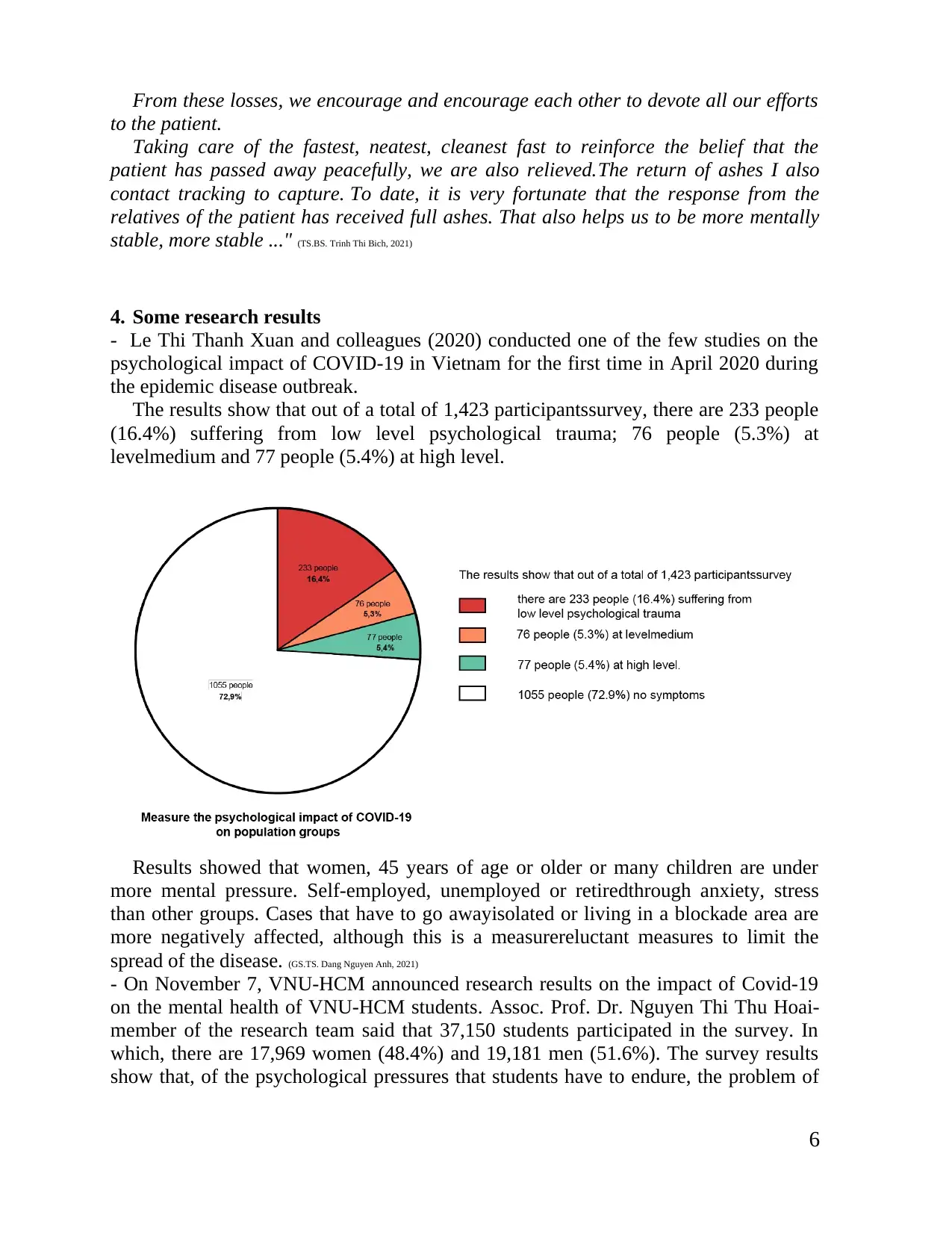
From these losses, we encourage and encourage each other to devote all our efforts
to the patient.
Taking care of the fastest, neatest, cleanest fast to reinforce the belief that the
patient has passed away peacefully, we are also relieved.The return of ashes I also
contact tracking to capture. To date, it is very fortunate that the response from the
relatives of the patient has received full ashes. That also helps us to be more mentally
stable, more stable ..." (TS.BS. Trinh Thi Bich, 2021)
4. Some research results
- Le Thi Thanh Xuan and colleagues (2020) conducted one of the few studies on the
psychological impact of COVID-19 in Vietnam for the first time in April 2020 during
the epidemic disease outbreak.
The results show that out of a total of 1,423 participantssurvey, there are 233 people
(16.4%) suffering from low level psychological trauma; 76 people (5.3%) at
levelmedium and 77 people (5.4%) at high level.
Results showed that women, 45 years of age or older or many children are under
more mental pressure. Self-employed, unemployed or retiredthrough anxiety, stress
than other groups. Cases that have to go awayisolated or living in a blockade area are
more negatively affected, although this is a measurereluctant measures to limit the
spread of the disease. (GS.TS. Dang Nguyen Anh, 2021)
- On November 7, VNU-HCM announced research results on the impact of Covid-19
on the mental health of VNU-HCM students. Assoc. Prof. Dr. Nguyen Thi Thu Hoai-
member of the research team said that 37,150 students participated in the survey. In
which, there are 17,969 women (48.4%) and 19,181 men (51.6%). The survey results
show that, of the psychological pressures that students have to endure, the problem of
6
to the patient.
Taking care of the fastest, neatest, cleanest fast to reinforce the belief that the
patient has passed away peacefully, we are also relieved.The return of ashes I also
contact tracking to capture. To date, it is very fortunate that the response from the
relatives of the patient has received full ashes. That also helps us to be more mentally
stable, more stable ..." (TS.BS. Trinh Thi Bich, 2021)
4. Some research results
- Le Thi Thanh Xuan and colleagues (2020) conducted one of the few studies on the
psychological impact of COVID-19 in Vietnam for the first time in April 2020 during
the epidemic disease outbreak.
The results show that out of a total of 1,423 participantssurvey, there are 233 people
(16.4%) suffering from low level psychological trauma; 76 people (5.3%) at
levelmedium and 77 people (5.4%) at high level.
Results showed that women, 45 years of age or older or many children are under
more mental pressure. Self-employed, unemployed or retiredthrough anxiety, stress
than other groups. Cases that have to go awayisolated or living in a blockade area are
more negatively affected, although this is a measurereluctant measures to limit the
spread of the disease. (GS.TS. Dang Nguyen Anh, 2021)
- On November 7, VNU-HCM announced research results on the impact of Covid-19
on the mental health of VNU-HCM students. Assoc. Prof. Dr. Nguyen Thi Thu Hoai-
member of the research team said that 37,150 students participated in the survey. In
which, there are 17,969 women (48.4%) and 19,181 men (51.6%). The survey results
show that, of the psychological pressures that students have to endure, the problem of
6
⊘ This is a preview!⊘
Do you want full access?
Subscribe today to unlock all pages.

Trusted by 1+ million students worldwide
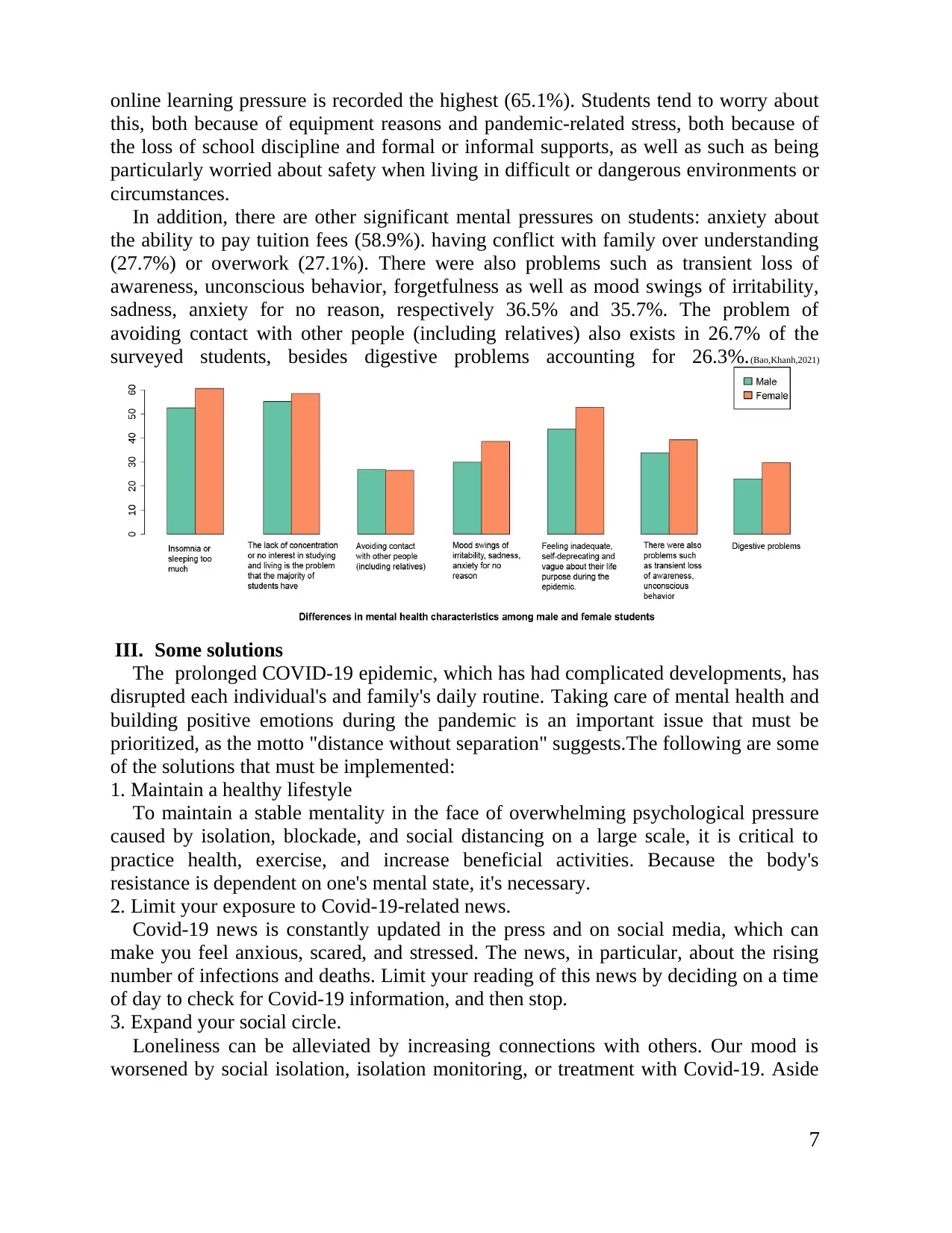
online learning pressure is recorded the highest (65.1%). Students tend to worry about
this, both because of equipment reasons and pandemic-related stress, both because of
the loss of school discipline and formal or informal supports, as well as such as being
particularly worried about safety when living in difficult or dangerous environments or
circumstances.
In addition, there are other significant mental pressures on students: anxiety about
the ability to pay tuition fees (58.9%). having conflict with family over understanding
(27.7%) or overwork (27.1%). There were also problems such as transient loss of
awareness, unconscious behavior, forgetfulness as well as mood swings of irritability,
sadness, anxiety for no reason, respectively 36.5% and 35.7%. The problem of
avoiding contact with other people (including relatives) also exists in 26.7% of the
surveyed students, besides digestive problems accounting for 26.3%.(Bao,Khanh,2021)
III. Some solutions
The prolonged COVID-19 epidemic, which has had complicated developments, has
disrupted each individual's and family's daily routine. Taking care of mental health and
building positive emotions during the pandemic is an important issue that must be
prioritized, as the motto "distance without separation" suggests.The following are some
of the solutions that must be implemented:
1. Maintain a healthy lifestyle
To maintain a stable mentality in the face of overwhelming psychological pressure
caused by isolation, blockade, and social distancing on a large scale, it is critical to
practice health, exercise, and increase beneficial activities. Because the body's
resistance is dependent on one's mental state, it's necessary.
2. Limit your exposure to Covid-19-related news.
Covid-19 news is constantly updated in the press and on social media, which can
make you feel anxious, scared, and stressed. The news, in particular, about the rising
number of infections and deaths. Limit your reading of this news by deciding on a time
of day to check for Covid-19 information, and then stop.
3. Expand your social circle.
Loneliness can be alleviated by increasing connections with others. Our mood is
worsened by social isolation, isolation monitoring, or treatment with Covid-19. Aside
7
this, both because of equipment reasons and pandemic-related stress, both because of
the loss of school discipline and formal or informal supports, as well as such as being
particularly worried about safety when living in difficult or dangerous environments or
circumstances.
In addition, there are other significant mental pressures on students: anxiety about
the ability to pay tuition fees (58.9%). having conflict with family over understanding
(27.7%) or overwork (27.1%). There were also problems such as transient loss of
awareness, unconscious behavior, forgetfulness as well as mood swings of irritability,
sadness, anxiety for no reason, respectively 36.5% and 35.7%. The problem of
avoiding contact with other people (including relatives) also exists in 26.7% of the
surveyed students, besides digestive problems accounting for 26.3%.(Bao,Khanh,2021)
III. Some solutions
The prolonged COVID-19 epidemic, which has had complicated developments, has
disrupted each individual's and family's daily routine. Taking care of mental health and
building positive emotions during the pandemic is an important issue that must be
prioritized, as the motto "distance without separation" suggests.The following are some
of the solutions that must be implemented:
1. Maintain a healthy lifestyle
To maintain a stable mentality in the face of overwhelming psychological pressure
caused by isolation, blockade, and social distancing on a large scale, it is critical to
practice health, exercise, and increase beneficial activities. Because the body's
resistance is dependent on one's mental state, it's necessary.
2. Limit your exposure to Covid-19-related news.
Covid-19 news is constantly updated in the press and on social media, which can
make you feel anxious, scared, and stressed. The news, in particular, about the rising
number of infections and deaths. Limit your reading of this news by deciding on a time
of day to check for Covid-19 information, and then stop.
3. Expand your social circle.
Loneliness can be alleviated by increasing connections with others. Our mood is
worsened by social isolation, isolation monitoring, or treatment with Covid-19. Aside
7
Paraphrase This Document
Need a fresh take? Get an instant paraphrase of this document with our AI Paraphraser
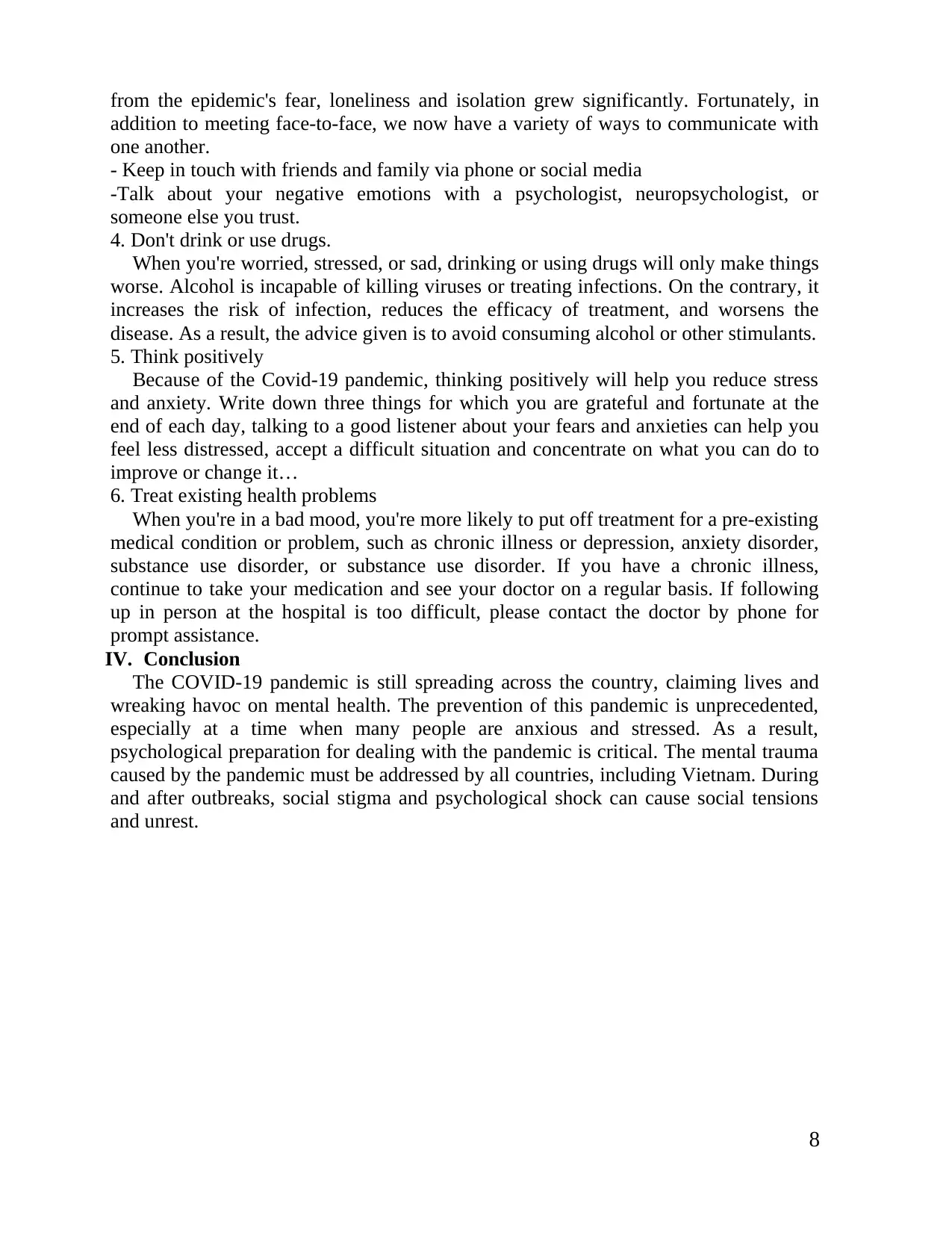
from the epidemic's fear, loneliness and isolation grew significantly. Fortunately, in
addition to meeting face-to-face, we now have a variety of ways to communicate with
one another.
- Keep in touch with friends and family via phone or social media
-Talk about your negative emotions with a psychologist, neuropsychologist, or
someone else you trust.
4. Don't drink or use drugs.
When you're worried, stressed, or sad, drinking or using drugs will only make things
worse. Alcohol is incapable of killing viruses or treating infections. On the contrary, it
increases the risk of infection, reduces the efficacy of treatment, and worsens the
disease. As a result, the advice given is to avoid consuming alcohol or other stimulants.
5. Think positively
Because of the Covid-19 pandemic, thinking positively will help you reduce stress
and anxiety. Write down three things for which you are grateful and fortunate at the
end of each day, talking to a good listener about your fears and anxieties can help you
feel less distressed, accept a difficult situation and concentrate on what you can do to
improve or change it…
6. Treat existing health problems
When you're in a bad mood, you're more likely to put off treatment for a pre-existing
medical condition or problem, such as chronic illness or depression, anxiety disorder,
substance use disorder, or substance use disorder. If you have a chronic illness,
continue to take your medication and see your doctor on a regular basis. If following
up in person at the hospital is too difficult, please contact the doctor by phone for
prompt assistance.
IV. Conclusion
The COVID-19 pandemic is still spreading across the country, claiming lives and
wreaking havoc on mental health. The prevention of this pandemic is unprecedented,
especially at a time when many people are anxious and stressed. As a result,
psychological preparation for dealing with the pandemic is critical. The mental trauma
caused by the pandemic must be addressed by all countries, including Vietnam. During
and after outbreaks, social stigma and psychological shock can cause social tensions
and unrest.
8
addition to meeting face-to-face, we now have a variety of ways to communicate with
one another.
- Keep in touch with friends and family via phone or social media
-Talk about your negative emotions with a psychologist, neuropsychologist, or
someone else you trust.
4. Don't drink or use drugs.
When you're worried, stressed, or sad, drinking or using drugs will only make things
worse. Alcohol is incapable of killing viruses or treating infections. On the contrary, it
increases the risk of infection, reduces the efficacy of treatment, and worsens the
disease. As a result, the advice given is to avoid consuming alcohol or other stimulants.
5. Think positively
Because of the Covid-19 pandemic, thinking positively will help you reduce stress
and anxiety. Write down three things for which you are grateful and fortunate at the
end of each day, talking to a good listener about your fears and anxieties can help you
feel less distressed, accept a difficult situation and concentrate on what you can do to
improve or change it…
6. Treat existing health problems
When you're in a bad mood, you're more likely to put off treatment for a pre-existing
medical condition or problem, such as chronic illness or depression, anxiety disorder,
substance use disorder, or substance use disorder. If you have a chronic illness,
continue to take your medication and see your doctor on a regular basis. If following
up in person at the hospital is too difficult, please contact the doctor by phone for
prompt assistance.
IV. Conclusion
The COVID-19 pandemic is still spreading across the country, claiming lives and
wreaking havoc on mental health. The prevention of this pandemic is unprecedented,
especially at a time when many people are anxious and stressed. As a result,
psychological preparation for dealing with the pandemic is critical. The mental trauma
caused by the pandemic must be addressed by all countries, including Vietnam. During
and after outbreaks, social stigma and psychological shock can cause social tensions
and unrest.
8
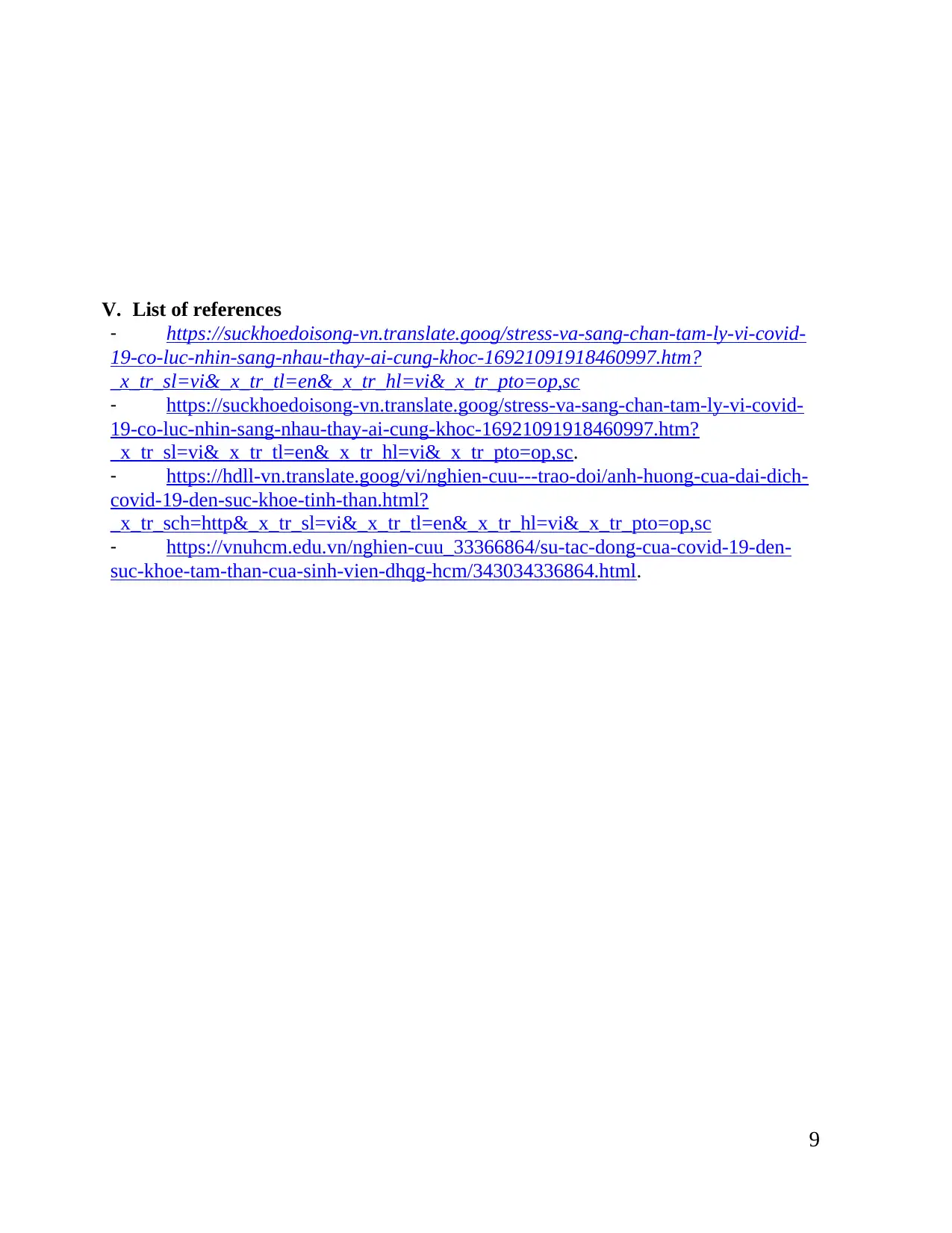
V. List of references
- https://suckhoedoisong-vn.translate.goog/stress-va-sang-chan-tam-ly-vi-covid-
19-co-luc-nhin-sang-nhau-thay-ai-cung-khoc-16921091918460997.htm?
_x_tr_sl=vi&_x_tr_tl=en&_x_tr_hl=vi&_x_tr_pto=op,sc
- https://suckhoedoisong-vn.translate.goog/stress-va-sang-chan-tam-ly-vi-covid-
19-co-luc-nhin-sang-nhau-thay-ai-cung-khoc-16921091918460997.htm?
_x_tr_sl=vi&_x_tr_tl=en&_x_tr_hl=vi&_x_tr_pto=op,sc.
- https://hdll-vn.translate.goog/vi/nghien-cuu---trao-doi/anh-huong-cua-dai-dich-
covid-19-den-suc-khoe-tinh-than.html?
_x_tr_sch=http&_x_tr_sl=vi&_x_tr_tl=en&_x_tr_hl=vi&_x_tr_pto=op,sc
- https://vnuhcm.edu.vn/nghien-cuu_33366864/su-tac-dong-cua-covid-19-den-
suc-khoe-tam-than-cua-sinh-vien-dhqg-hcm/343034336864.html.
9
- https://suckhoedoisong-vn.translate.goog/stress-va-sang-chan-tam-ly-vi-covid-
19-co-luc-nhin-sang-nhau-thay-ai-cung-khoc-16921091918460997.htm?
_x_tr_sl=vi&_x_tr_tl=en&_x_tr_hl=vi&_x_tr_pto=op,sc
- https://suckhoedoisong-vn.translate.goog/stress-va-sang-chan-tam-ly-vi-covid-
19-co-luc-nhin-sang-nhau-thay-ai-cung-khoc-16921091918460997.htm?
_x_tr_sl=vi&_x_tr_tl=en&_x_tr_hl=vi&_x_tr_pto=op,sc.
- https://hdll-vn.translate.goog/vi/nghien-cuu---trao-doi/anh-huong-cua-dai-dich-
covid-19-den-suc-khoe-tinh-than.html?
_x_tr_sch=http&_x_tr_sl=vi&_x_tr_tl=en&_x_tr_hl=vi&_x_tr_pto=op,sc
- https://vnuhcm.edu.vn/nghien-cuu_33366864/su-tac-dong-cua-covid-19-den-
suc-khoe-tam-than-cua-sinh-vien-dhqg-hcm/343034336864.html.
9
⊘ This is a preview!⊘
Do you want full access?
Subscribe today to unlock all pages.

Trusted by 1+ million students worldwide
1 out of 9
Related Documents
Your All-in-One AI-Powered Toolkit for Academic Success.
+13062052269
info@desklib.com
Available 24*7 on WhatsApp / Email
![[object Object]](/_next/static/media/star-bottom.7253800d.svg)
Unlock your academic potential
Copyright © 2020–2026 A2Z Services. All Rights Reserved. Developed and managed by ZUCOL.




